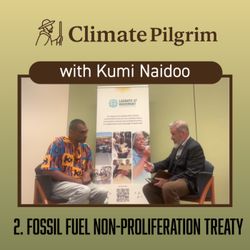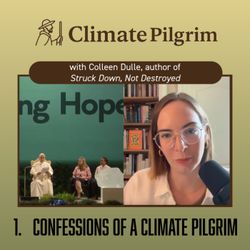Latest episode

7. Rumble in the Jungle COP
40:12||Season 4, Ep. 7Full show notes, transcripts, and more at wickedproblems.earth Welcome to Belém, where the world (with some notable exceptions) has gathered to talk about saving the Amazon as if it weren’t already on fire. Cataloguing the chaos leading up to COP30 Ben Cooke of The Times. His team’s reporting makes clear why the mood isn’t exactly jubilant: the clean-power alliance with zero members, the rainforest pledges with little progress, and the renewed swagger of fossil petrostates. Even potential bright spots, like the Tropical Forest Forever Facility announced last week, were somewhat dimmed by the spectacle of UK prime minister Keir Starmer reversing an earlier decision not to go to COP, only to make the trip to then announce his government wouldn’t be part of the hoped-for signature initiative out of this event.We chat with Ben about all of that and more.
More episodes
View all episodes

6. Trump nukes Net Zero Shipping
01:26:07||Season 4, Ep. 6Full show notes and ad-free listening at wickedproblems.earthShipping is one of those things that’s just supposed to work. Post-Titanic, we created a set of rules that currently are looked after by the International Maritime Organization (IMO), which successfully removed much of the drama from shipping — so successful that Britain’s “Shipping Forecast” is now soothing ASMR for bedtime listening. But last month at the IMO in London, what should have been a procedural meeting on decarbonising shipping turned into something far messier. According to a Financial Times investigation, U.S. officials didn’t just lobby against a global carbon levy on shipping — they allegedly threatened, intimidated and black-mailed delegates from smaller nations. Developing-country delegates said they were warned their ships would face higher U.S. port fees, their officials denied visas, and their trade punished if they didn’t abandon support for the Net Zero Framework the IMO had endorsed only six months earlier. “It was like dealing with the Mob,” one diplomat told the FT. In the end, it worked. The deal — the world’s first carbon-pricing mechanism for global shipping — was postponed for a year. The IMO, normally the most technocratic of international bodies, was left “in a state of complete shock.” For the uninitiated this may sound arcane. But shipping matters. Roughly 90 % of global trade moves by sea; the sector accounts for about 3 % of global CO₂ emissions — more than Germany — and until now has been largely outside the reach of meaningful climate regulation. The Net Zero Framework was meant to change that. It had already been provisionally agreed by a majority of countries in April. But by October, something changed. Countries like China, India, Panama, Liberia — and even Greece and Cyprus, who broke with the EU line — suddenly voted to adjourn. news.wickedproblems.ukAnd the shift didn’t come from nowhere: it came from pressure. From a U.S. administration that now treats climate policy as an existential threat to American interests.🎧 Who we spoke toCarly Hicks (Chief Strategy & Impact Officer, Opportunity Green) explains how the IMO had once seemed one of the last genuinely global forums where climate ambition could meet technical reality — until the process was capsized by politics. Ariane Morrissey (Senior Editor, Ship.Energy) was in the building as the talks imploded, describing a surreal scene where delegates who came to discuss fuel standards found themselves under threats of sanctions and visa bans. Professor Tristan Smith (University College London) gave the longer-view: this is less a failure of climate tech than a warning shot about the fragility of multilateralism itself. He argues the US may have bought time — but may also have triggered the rise of regional regulation. The EU’s carbon-trading scheme now covers shipping; Singapore and Japan are exploring carbon levies. The patchwork world is arriving faster than the ships can adjust. 🎵 Outro music: “Sailing By” (1963) layered with a long-wave “Shipping Forecast” transmission — that calm voice reading “Viking, North Utsire, South Utsire…”
5. Laurie Laybourn on Overshooting 1.5°C
43:26||Season 4, Ep. 5Bonus content at wickedproblems.earth Overshoot, a new four-part documentary series from climate strategist and Wicked Problems alum Laurie Laybourn—goes further than nearly anyone has before. And he came back to unpack some of the key ideas in Overshoot and what he hopes people will do with it.In Overshoot the story starts with the fact that we can no longer avoid the storm, we’ve enetered it. How to survive and steer through it—generation after generation—is the conversation we urgently need to have now. Drawing on interviews with diplomats, scientists, and communities on the frontlines, Laybourn dismantles the win/lose logic that has dominated climate politics since Paris and asks what it means to live in an age of overlapping crises and hard adaptation choices.Our conversation ranges from the myth of Easter Island to the politics of “carbon sucking,” from managed retreat in Wales to the legal aftershocks of 1.5°C’s failure. It’s a clear-eyed look at what comes next—and why, even at the moment of “net zero,” we’ll be living in the most dangerous period in human history.
4. Touch the Feckin' Grass. w Bishop Martin Hayes, Jane Mellett, Eamon Ryan
01:08:54||Season 5, Ep. 4Discussing the Irish contingent at the Raising Hope conference and the future of faith and climate action -Bishop Martin Hayes of Kilmore; former Irish environment minister and Green Party leader Eamon Ryan; and campaigner Jane Mellett, church manager at Irish Catholic overseas development agency Trocaire. More information at climatepilgrim.com.
3. Who is my Tu/Akoi (Neighbour)?
32:21||Season 5, Ep. 3Who is my neighbour? 1.5°C is about neighbours, not numbers. Climate Minister Maina Talia of Tuvalu speaks to Richard Delevan about moral clarity in climate and denies the Australian 'climate visa' is about relocating his population. More information at climatepilgrim.com.
2. The Fossil Fuel Non-Proliferation Treaty, with Kumi Naidoo
55:13||Season 5, Ep. 2Should Pope Leo endorse a Fossil Fuel Non-Proliferation Treaty at COP30? Climate Pilgrim Episode 2: Dr. Kumi Naidoo 'cautiously optimistic' the Vatican and others will add up to 44 countries endorsing Treaty initiative by landmark April conference in Colombia. More detail at climatepilgrim.com.
1. Confessions of a Climate Pilgrim
56:45||Season 5, Ep. 1Did Pope Leo double down on climate for the 10th anniversary of Laudato Si'? Or change the relationship between faith and climate action? Colleen Dulle, Vatican Correspondent for America Magazine and author of Struck Down, Not Destroyed, joins Richard Delevan to discuss reactions. More info and episodes at ClimatePilgrim.com.
